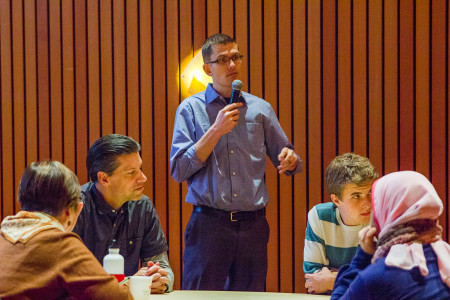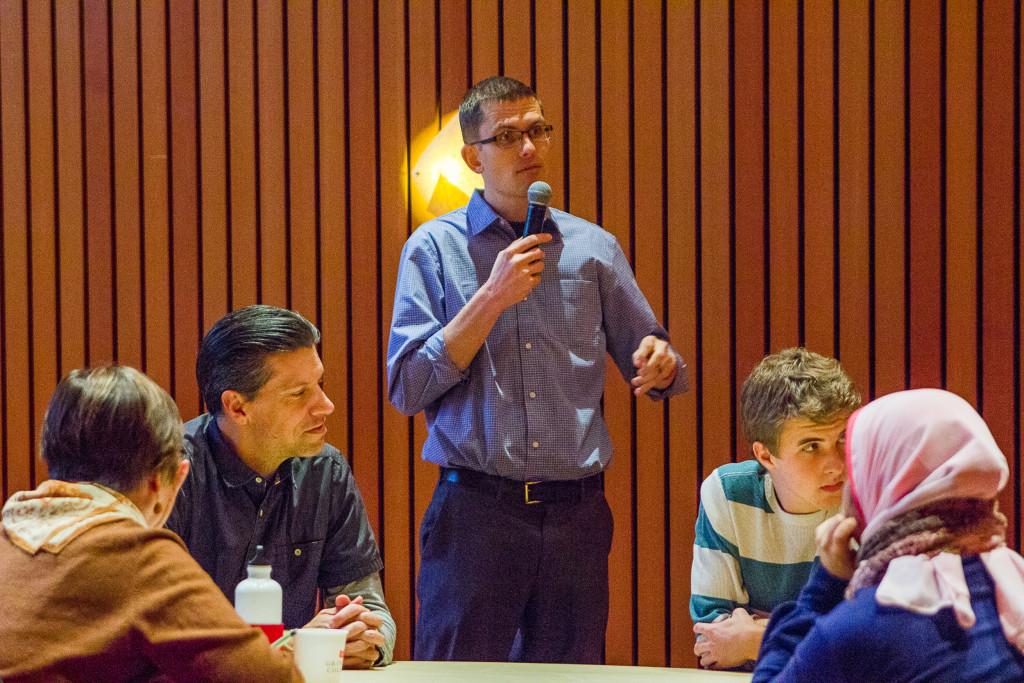
JON SUNDBY, News Editor
sundbyjo17@grinnell.edu
It’s primary elections season, which means that the nation is suddenly focused on Iowa’s town halls and the fiery speeches that emerge from them. Much of this rhetoric, however, doesn’t actually revolve around policy, but rather on demonizing the other side. This Thursday and Friday, Nov. 19 and 20, Phil Neisser, a liberal political scientist, and Jacob Hess, a conservative psychologist, came to campus to give a talk and conduct a workshop on how to lesson this demonization and steer national conversations in a more productive manner.
The pair first met during a conference for the National Center for Dialogue and Deliberation (NCDD), where both Neisser and Hess were presenting. Hess was one of the few conservatives at the conference, so Neisser sought him out to discuss how to bridge the divide between the two ideologies.
“I went to his panel, we introduced ourselves to each other and said, ‘You know, we both believe in this dialogue between liberals and conservatives, leftists and rightists. We should do it, so let’s do it,’” Neisser explained.
After the conference, Neisser and Hess stayed in touch, debating and critiquing each other’s ideas over letters, email and phone calls. Emerging from this process was the foundations of a book, entitled, “You’re Not as Crazy as I Thought (But You’re Still Wrong): Conversations Between a Die-Hard Liberal and a Devoted Conservative,” co-authored by Neisser and Hess over the course of their two-year conversation.
“We would each write ten pages on gay marriage, marriage equality, heterosexuality and homosexuality—not knowing what the other was going to say, just our beliefs—and send them to each other and then start marking up each other’s copies — “What do you mean by this, why do you believe this?’” said Neisser.
Through their dialogue, Neisser and Hess discovered a lot about the nature of each other’s ideologies. Both tried not to base their arguments on their assumptions of the other’s point. In fact, often they found that they held the same values but simply didn’t agree on each other’s interpretation or solution.
“It was really great to be able to dive so deep into conversations that can be so difficult. … Among other things, it was a way for me to see what the real disconnect was, rather than the surface disconnect,” Hess said.
Despite the current hostile climate in politics, the two don’t think that the situation is unprecedented when analyzed through the lens of American political history. Both Neisser and Hess brought up examples, from the Jefferson-era to the 1960s, of times when the political climate was even colder.
“It’s a long tradition, it’s a deep problem. It’s not just a new problem that we can push back and there’s no ‘good old days’ that we can go back to,” Neisser said.
Despite this precedent, the two said that this trend is mutable. However, they think that change must occur from the bottom up, as they both held little faith in the prospect of Congress becoming more tolerant.
Hess and Neisser said that productive conversations and dialogue are an essential aspect of accomplishing this goal. Through programs like the “The Village Square,” of which Hess is a director, they hope to facilitate these discussions amongst citizens throughout the nation. The pair is especially fond of the “living room” model of discussion, where six people with different views on a topic come together and have a moderated conversation on the subject.
“It kind of sounds like a fight: I’ll bring two of my friends, you bring two, and I’ll meet you. But instead of a back alley, it’s a living room, and you end up having a good experience,” Hess said.
Throughout these conversations, the discourse is kept civil yet direct, and perhaps even uncomfortable at times. Hess, whose current work focuses on mindful stress reduction, compared the process to sitting meditation.
“In mediation, when you sit down on the cushion, you’re not expecting this is going to be all fun. It’s hard … when you stop and be silent, you start to notice all this kind of stuff inside the heart, and when you actually face it, it’s not easy. So a large number of our students just walk away after the first class. But what if you stick with it, you know? Instead of just sitting with your body and your mind, you’re sitting with the contradictions in the body politic,” Hess said.
Even if the conversations they are trying to implement don’t lead to agreement and compromise, the pair said that these discussions are important to humanize a political opponent and potentially lead to a less hostile political sphere.
“You’re wrong, but you’re a fellow human being and my friend,” Neisser concluded.





























































